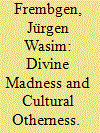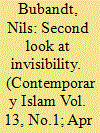| Srl | Item |
| 1 |
ID:
076319


|
|
|
|
|
| Publication |
2006.
|
| Summary/Abstract |
This article portrays several little-known examples of unusual and eccentric individuals embodying different forms of divine 'madness' and representing cultural otherness among local people in the high mountain areas of Northern Pakistan. The precise position of these men as more or less 'holy' (diw na and faq r) or simply 'crazy' (p gal) remains evidently contested. The article argues that ultimately, through their marginal state, the various forms of divine madmen can be seen to embody the potency of disorder in a local Islamic environment as a necessary element and completion of an all-encompassing divine order
|
|
|
|
|
|
|
|
|
|
|
|
|
|
|
|
| 2 |
ID:
164018


|
|
|
|
|
| Summary/Abstract |
The Arab concept al-ghayb refers to the hidden, the unseen, the invisible. The term encompasses a range of important phenomena in Islam and in the everyday experiences of Muslims. The dominion of the unseen (alam al-ghayb) includes those parts of reality that cannot be seen simply because they are covered by other visible objects. It also refers to those phenomena that by their nature cannot be perceived (e.g. the face or throne of God, paradise, hell, the past, or the future), as well as those objects that are blocked from view by one’s perspective (Drieskens 2006; Mittermaier 2011; Suhr 2013). Al-ghayb is important to the notion of barzakh, the intermediary realm between life and death; to the issue of veiling; to visions of deceased saints or dreams about the Prophet Muhammad as well as to the uncontrollable powers of jinn, angels, magic, the evil eye, and omens (Pandolfo 1997;
|
|
|
|
|
|
|
|
|
|
|
|
|
|
|
|